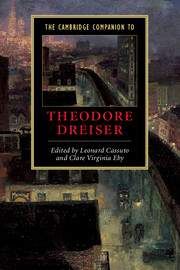2 - Dreiser and the uses of biography
from Part I - Backgrounds and contexts
Published online by Cambridge University Press: 28 May 2006
Summary
Like Walt Whitman and Mark Twain before him, Dreiser has been read as a deeply autobiographical writer. We know, for instance, what Donald Pizer means by saying that Dreiser is “not only Jeff and Davies [in 'Nigger Jeff'[ but will also be Carrie and Hurstwood, Jennie and Lester, Clyde and Roberta, and Steward and Solon.” Yet these same characters can also be attributed to Dreiser’s penchant for writing stories about people utterly unlike himself. A short list of originals for his major characters would include his rebellious sisters, murderers, painters, financiers, show girls, his mistresses (and their relatives), prominent Quakers, ministers, politicians, his parents, and many a New Woman of his day. His interest in them is a product of a novelist’s natural curiosity about the men and women who inhabit his world. But in Dreiser’s case there is also evidence of a strong attraction to formal biography. His writing recurrently makes use of biographical genres, from the lowly interview to more elaborate popular texts, including the criminal biography, the biography of the businessman, and the historical novel.
Dreiser’s impulse to write concurrently in memoirs and in biographical forms sprang from his view of himself as both a chronicler and a representative figure of his era. He shared this trait with contemporaries as different as Henry Adams, Gertrude Stein, and Edward Bok, whose desire to break down the division between autobiography and biography led them to write about themselves in the third person. Dreiser was less technically experimental, but he resembled them in blurring the distinctions between the two types of writing. He gave high marks to the “absolutely vital, unillusioned biography such as that of Jean Jacques Rousseau’s Confessions [and[ Cellini’s Diary” and claimed them as models for his own work.
- Type
- Chapter
- Information
- The Cambridge Companion to Theodore Dreiser , pp. 30 - 46Publisher: Cambridge University PressPrint publication year: 2004
- 1
- Cited by



